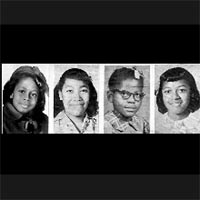On September 15, 1963, four Birmingham, Alabama girls, Addie Mae Collins, Denise McNair, Carole Robertson and Cynthia Wesley, lost their lives during the bombing of the Sixteenth Street Baptist Church. In 2011, a marker was finally dedicated in their names at the site of the vicious, racially motivated, murderous attack.
Just three months after the murder of Medgar Evers in Jackson, Mississippi, and two weeks after the March on Washington and Dr. King’s momentum-building “I Have a Dream” speech in 1963, the Alabama tragedy became the pivotal event in the Civil Rights Movement. Singer Nina Simone wrote “Mississippi Goddam” in immediate response to hearing the news: “I shut myself up in a room and that song happened,” she said of the song that begins, “Alabama’s got me so upset.” From that moment forward, Simone was committed to writing and performing material that would jolt people awake or into action. It remains her most enduring work.
Joan Baez had of course walked alongside Dr. King at the marches in the South all along; her tribute was a recording of “Birmingham Sunday” by her brother-in-law, the writer Richard Fariña. Each girl was remembered by name in the verses, set to the tune of a beautiful folk melody. Fifty-plus years on, both songs remain painful reminders of the brutalities waged by so-called humanity, here and yonder, year in and year out, against women, girls and Black lives.
Filed under: anti-capitalist, anti-war, Arts and Culture, Origin of Song, Protest Songs, racism, 16th Street Baptist Church, Addie Mae Collins, Birmingham Sunday, Black Lives Matter, Carole Robinson, Cynthia Wesley, Denise McNair, Four Little Girls, Joan Baez, Nina Simone
